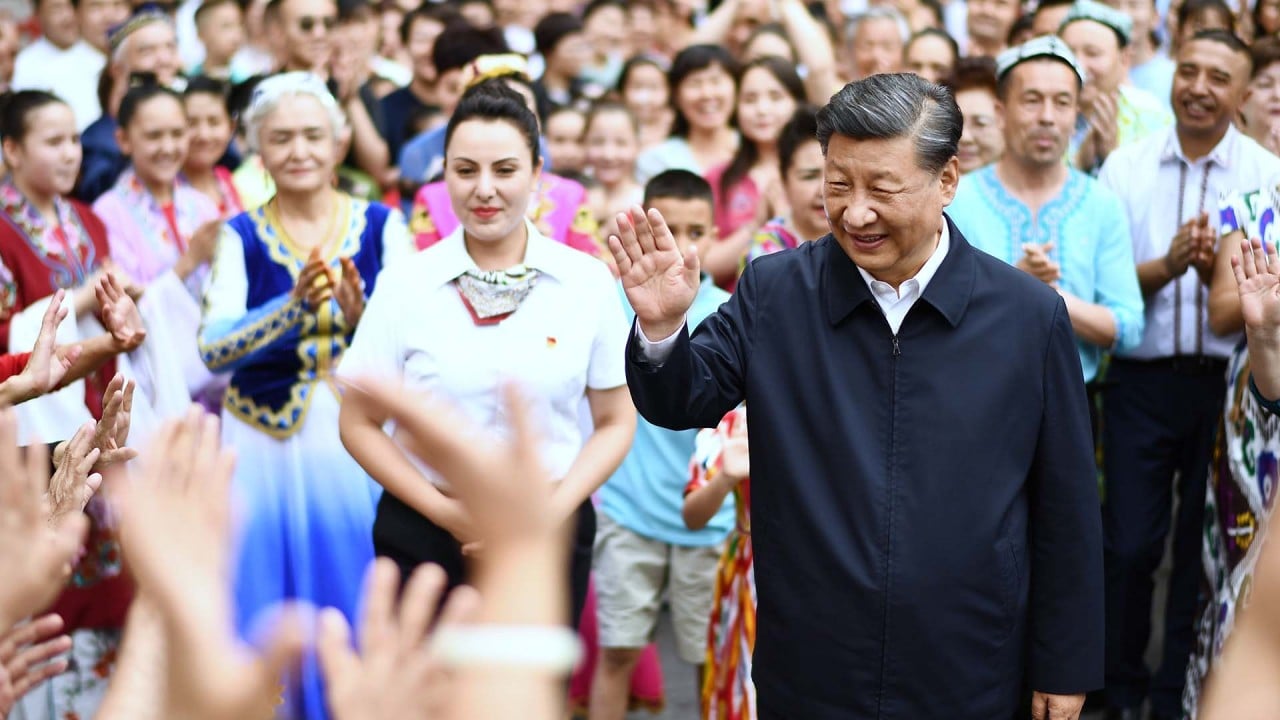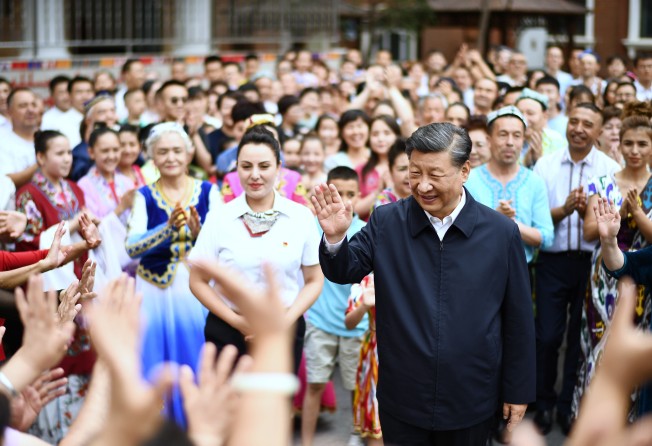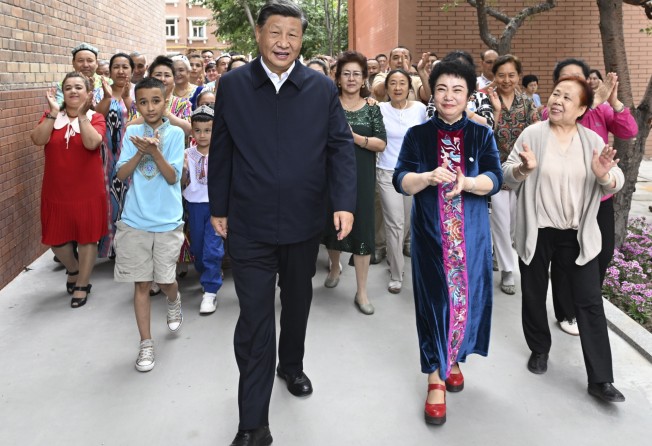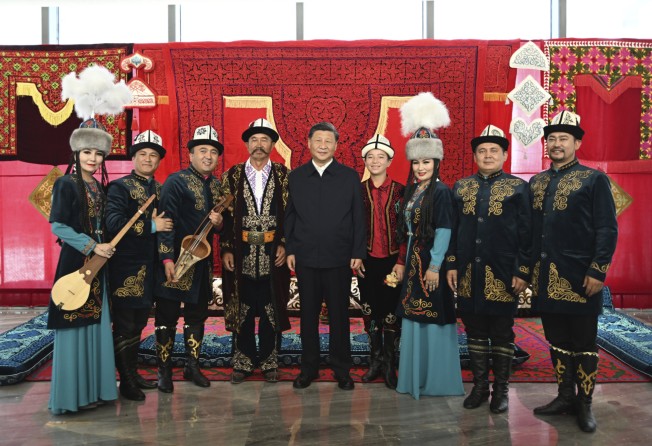
02:04
China’s President Xi visits far western Xinjiang region for first time in 8 years

Chinese President Xi Jinping said Xinjiang will be a main hub for connecting China to other nations as he made his first trip to the region since he ordered a hard strike on violence there which has become a source of friction with the United States.
State media reported on Friday that Xi had visited the far western region on Tuesday and Wednesday, in his first public appearance since he was in Hong Kong to mark the city’s 25th anniversary of return to Chinese rule on July 1. It was also his first trip to Xinjiang in eight years.
“The Belt and Road Initiative has yielded fruitful results over the years,” Xi said, according to the Xinhua news agency, referring to China’s massive infrastructure and trade strategy connecting the nation to others around the world, particularly in Asia and Africa.
“With the deepening of the construction of the belt and road, Xinjiang is no longer a remote area, but a core hub. You are doing something of historical significance and have achieved good results,” Xi said on Tuesday afternoon while visiting the Urumqi International Land Port Area in the regional capital.
Xi also called on local cadres to “tightly hold on to the goal to maintain social and political stability” while leading “high quality development”, Xinhua reported.
“The long term stability of Xinjiang hinges on people’s hearts,” Xi said.
Lai Hongyi, associate professor of social sciences at the University of Nottingham, said Xi’s messaging in Hong Kong and Xinjiang was similar.
“In his speech in Hong Kong, Xi seemed to suggest that the political situation there was well under control and that Hong Kong leaders should proceed with their governance agenda. In Xinjiang, a similar message was being conveyed,”
Xie Maosong, senior researcher at the Chinese Academy of Science’s China Institute for Innovation and Development Strategy, said Xi’s trip was meant to send out the message that Xinjiang had entered a new stage of economic development and Beijing was ready to pour enormous resources into the region.
“Beijing sees Xinjiang as having shifted from the stage of turmoil into the stage of stability. Now, from the stage of stability, Beijing wants to focus on governance and development,” Xie said.

Xie said the emphasis on Xinjiang as a core hub of the belt and road strategy is a signal that Beijing would accelerate the pace of turning the region into a gateway to Central Asia and Europe.
“Beijing is ready to pour in a lot of resources including investment and talents. The scale would be unprecedented,” he said.
Xinjiang is seen as a sensitive topic, with Beijing blaming years of violent attacks on mainly Muslim ethnic Uygur separatists, while the West accuses it of cultural genocide and state-sponsored forced labour. Beijing says it has taken a series of tough measures against what it deems terrorism and extremism, including setting up vocational training centres, which critics describe as detention camps.
Western nations including the US have accused Beijing of violating basic human rights in Xinjiang and using forced labour, and imposed a series of sanctions on entities deemed responsible.
Xi said the local government should do a better job of pushing forward “Muslim sinicisation”, and establish a team of politically reliable religious cadres.
He also ordered local cadres to engage with the outside world and invite more foreigners to visit the region to “tell a good story about China’s Xinjiang”.
Alfred Wu, associate professor at the Lee Kuan Yew School of Public Policy at the National University of Singapore, said the timing of the visit, two weeks after his trip to Hong Kong, was meant to send out a message.
“Both Hong Kong and Xinjiang are controversial places at the centre of the China-US rivalry, and Xi wanted to tell the world that he is in control,” Wu said.
Turning Xinjiang into a gateway also means that Beijing is confident its influence is expanding to other countries, he added.
Lai noted that Xi’s Xinjiang trip followed a visit to the region by United Nations human rights commissioner Michelle Bachelet, although she was accompanied throughout by Chinese officials.
Xi’s trip also came just months ahead of a Communist Party congress that will see a major leadership reshuffle, with the president expected to start an unprecedented third term.
“Xi’s visit may also signal to the 20th Party Congress that he has been able to bring stability to both Hong Kong and Xinjiang, and has been able to counter the pressure from the West regarding both places, despite criticisms within China over his robbing Hong Kong of its special and free status, and despite international criticism of his heavy-handed crackdown on freedoms in Hong Kong and the mass detention of Uygurs and other minorities in Xinjiang,” Lai said.
“Xi also wants to send a message that he deserves the third term, the third term is the key word,” Wu said.
Xi’s last trip to Xinjiang was in 2014, when he visited military and police officers in Kashgar, watched an anti-terrorism drill and visited a school, and ordered the violent terrorism be dealth with by the “most effective means”.
But hours after he left, a knife and bomb attack in the capital Urumqi killed three people and injured 79. Beijing blamed the attack on the separatist East Turkestan Islamic Movement and those found guilty of carrying it out were either jailed or executed.
China and the US have clashed over Xinjiang in recent years. The US accuses China of committing genocide against the Uygurs and imposed sanctions on Chen Quanguo, party chief of the region from 2016 to 2021. Washington also enacted a forced labour prevention act last month that blocks imports from the region unless companies can prove forced labour was not involved.
Xie said Xi’s statement that Xinjiang would become a core hub for the belt and road plan was also meant to send a message that Beijing did not care about “foreign slandering” and would focus on economic development.
“This shows his confidence in the Belt and Road Initiative, his attempt to sell the [plan] as a great success to the nation and the party,” Lai said.

Xi also made a trip to Shihezi, headquarters of the eighth division of the Xinjiang Production and Construction Corps (XPCC), a state-owned economic and paramilitary organisation.
“The status of the XPCC is indispensable … more efforts should be made to make XPCC even bigger and stronger and more prosperous,” he said.
Xie said Beijing had plans to increase the influence of the XPCC.
“Its area will be expanded and many of its functions will be enhanced, and there will be better coordination between XPCC and the autonomous region,” Xie said.
The XPCC is a parallel government within the Xinjiang Uygur autonomous region. It acts as a security force at China’s borders, while driving farming and development in the border region.
In 2020, Washington banned imports of cotton produced by the XPCC over the alleged use of forced labour.
Xi also visited the residential community of Guyuanxiang in Urumqi. Xie said the community was picked as it showcased ethnic harmony.
“About 90 per cent of the residents there are ethnic minorities and many are migrant workers. It is an example of ethnic harmony,” he said.
Xi also watched a show based on the Kyrgyz epic Manas, saying it was a treasure for both the Kyrgyz minority group and the Chinese nation.
Xie said Xi’s itinerary highlighted the importance of ethnic unity.
“Chinese culture is a convergence of many ethnic cultures and Manas is part of it.” he said.
Chen left his job in December and now works on agricultural and rural affairs at a top party organ. He was replaced by rising political star and former Guangdong governor Ma Xingrui. His appointment was seen as a signal that Beijing was confident about stability in Xinjiang and wanted to use Ma’s experience as a governor of the southern economic powerhouse for Xinjiang’s economic development, Xie noted.
Lai said Xi’s visit, just seven months after Ma took over, was also meant to be a personal endorsement of the new Xinjiang chief.
“Xi would use his visit to check out the development in Xinjiang under Ma, confirm his new policy, and consolidate support from Ma who is tipped to become a member of the Politburo, the most powerful political body of China.”